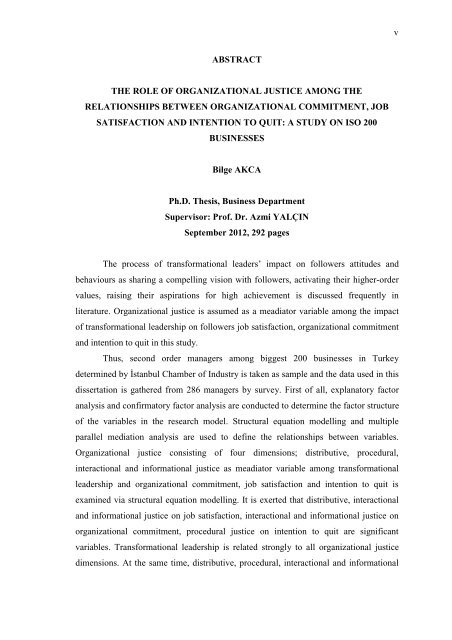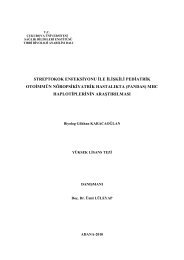- Page 1 and 2: TÜRKİYE CUMHURİYETİ ÇUKUROVA
- Page 3 and 4: Çukurova Üniversitesi Sosyal Bili
- Page 5: Anahtar Kelimeler: Örgütsel Adale
- Page 9 and 10: 2.2.5. Türk İş Kültüründe Ör
- Page 11 and 12: KAYNAKÇA .........................
- Page 13 and 14: Tablo 26: Dönüşümcü Liderlik i
- Page 15 and 16: BÖLÜM I GİRİŞ Bass’ın (1997
- Page 17 and 18: 1.1. Problemin Tespiti Çalışma
- Page 19 and 20: teorilere değinilmiş, bu inceleme
- Page 21 and 22: Çalışma dönüşümcü liderlik
- Page 23 and 24: 1.5. Araştırma Planı Çalışman
- Page 25 and 26: veya diğer otoritelerin yönetimi
- Page 27 and 28: 1998). Bu dönemdeki adalet anlayı
- Page 29 and 30: • Bütün vatandaşlar etkili bir
- Page 31 and 32: elirlenen ek hakları ve çalışma
- Page 33 and 34: kazanımdır. Kurumsallaşmış ör
- Page 35 and 36: Örgütlerde adalet teorileri hak t
- Page 37 and 38: yargılarını da dikkate almaktad
- Page 39 and 40: Araçsal model İlişkisel model Se
- Page 41 and 42: Güvenirlilik otorite sahiplerinin
- Page 43 and 44: ilgilere başvururlar. Van Den Bos
- Page 45 and 46: 2.1.1.1. Referans Bilişsel Teori A
- Page 47 and 48: ilişkin olumsuz algılamalar her i
- Page 49 and 50: adalete ilişkin yargılar araştı
- Page 51 and 52: Greenberg, Allan Lind ve Tom Tyler
- Page 53 and 54: olduğunda çalışanların örgüt
- Page 55 and 56: maliyetler gözetilerek dağıtılm
- Page 57 and 58:
öğretmenlerin otonomiye daha fazl
- Page 59 and 60:
etmesini sağlarken, düşük stat
- Page 61 and 62:
Dağıtım adaleti özellikle ideol
- Page 63 and 64:
Tepper (2001) dağıtım adaletinin
- Page 65 and 66:
adaleti bir örgütte uygulanan pro
- Page 67 and 68:
İşlem adaletinin işletme süreç
- Page 69 and 70:
yürütülen işlemler arasında fa
- Page 71 and 72:
derece kısıtlı olduğu gerçeği
- Page 73 and 74:
olmasını, grup normları içinde
- Page 75 and 76:
Farklı teoriler karşısında kar
- Page 77 and 78:
sahip olmasına rağmen, pek çok z
- Page 79 and 80:
ağlamındaki uygulaması algılanm
- Page 81 and 82:
sürecinde bireylerin bu süreçten
- Page 83 and 84:
Bazı araştırmacılar (Brockner v
- Page 85 and 86:
adil davranılmasını gruba aidiye
- Page 87 and 88:
temel moderatörleri verilen karar
- Page 89 and 90:
kararların mantıklı gerekçesini
- Page 91 and 92:
doğuşu ve yayılması ile “Futu
- Page 93 and 94:
in Çoban el-Burgazi’nin tahminen
- Page 95 and 96:
Örgütsel adaletin günümüz kavr
- Page 97 and 98:
cihan, er katında değmeyesin bir
- Page 99 and 100:
Bu durumun nedenleri arasında kamu
- Page 101 and 102:
adalet boyutu etkileşim adaletidir
- Page 103 and 104:
iklimde faaliyet gösterdikleri iç
- Page 105 and 106:
Altıntaş (2006) Türkiye’de dev
- Page 107 and 108:
Türkiye’de yapılan başka çal
- Page 109 and 110:
Tablo 3 Batıda ve Türkiye’de Ö
- Page 111 and 112:
elirtilmektedir (De Boer, vd., 2002
- Page 113 and 114:
adaletsizliği çalışanın hiyera
- Page 115 and 116:
Adaletsiz bir durumda bireyin tepki
- Page 117 and 118:
ilgilerin paylaşımı nedeniyle bi
- Page 119 and 120:
- Suçu önleme, toplumda suça ned
- Page 121 and 122:
kendilerini daha iyi hissettiklerin
- Page 123 and 124:
kişilik yapısı gibi farklı değ
- Page 125 and 126:
111 Durumsal liderlik teorisi kapsa
- Page 127 and 128:
113 Yazında “laissez-faire” ş
- Page 129 and 130:
görev için anlam yaratır. Entele
- Page 131 and 132:
1991). İlham verici motivasyonun e
- Page 133 and 134:
sağlamaktadır. Diğer taraftan Am
- Page 135 and 136:
(işlem adaleti) çok, taraflar ara
- Page 137 and 138:
maliyetleri düşürmeyle ilgilidir
- Page 139 and 140:
işin kendisi gelmektedir (Smith, 1
- Page 141 and 142:
yeteneklerini kullanma düzeyi ile
- Page 143 and 144:
ağlamda Salancik (1977) iradeye da
- Page 145 and 146:
dayanan durumda kişi, işyerinden
- Page 147 and 148:
2.7. Kavramlar Arasındaki İlişki
- Page 149 and 150:
1996, s.958) Amerika’da bulgulard
- Page 151 and 152:
ağlılıkla ilgili olduğuna, Alex
- Page 153 and 154:
ödüllerin iş tatmini ve örgüts
- Page 155 and 156:
eleştiriler de bulunmaktadır (Yuk
- Page 157 and 158:
olarak örgütsel adalet tanımlanm
- Page 159 and 160:
Dönüşümcü Liderlik H1a H1b H1c
- Page 161 and 162:
3.1. Araştırmanın Kapsamı ve Y
- Page 163 and 164:
gerektiği ifade edilmektedir. Ara
- Page 165 and 166:
“4=Katılıyorum” ve “5=Tamam
- Page 167 and 168:
Moormann’ın (1993) geliştirdiğ
- Page 169 and 170:
örgütte çalışmaya devam etme e
- Page 171 and 172:
oluşturmadıklarının anlaşılma
- Page 173 and 174:
yapıyı temsil edecek yapıları b
- Page 175 and 176:
Tablo 7 Uyum İndeks Değerleri ve
- Page 177 and 178:
modeli ve hipotezleri oluşturulmu
- Page 179 and 180:
Tablo 9 Verilere İlişkin Normalli
- Page 181 and 182:
programlarda çok değişkenli uç
- Page 183 and 184:
silme yönteminde ise değişkenler
- Page 185 and 186:
3.5.2. Örneklemin Demografik Özel
- Page 187 and 188:
anlamlı ve 0’dan farklı olup ol
- Page 189 and 190:
(Tablo 12’nin devamı) 175 I7:Yö
- Page 191 and 192:
Tablo 13 Keşfedici Faktör Analizi
- Page 193 and 194:
elirleme amacıyla kullanılmaktad
- Page 195 and 196:
181 Araştırmada kullanılan ölç
- Page 197 and 198:
Tablo 15 Ölçüm Modeli İçin Eş
- Page 199 and 200:
modelin fazla tanımlanmış model
- Page 201 and 202:
3.5.5.3. Yapı Geçerliliği ve Öl
- Page 203 and 204:
(Tablo 17’nin devamı) DL37 0,89
- Page 205 and 206:
işlem, etkileşim, bilgi adaleti b
- Page 207 and 208:
karmaşıklığını azalttığı i
- Page 209 and 210:
Şekil 8. Araştırmaya ilişkin ya
- Page 211 and 212:
3.5.6.3. Yapısal Eşitlik Modeline
- Page 213 and 214:
yüklerinin her iki aşamada da kar
- Page 215 and 216:
Şekil 9. Yapısal eşitlik modelin
- Page 217 and 218:
araştırmada öne sürülen model
- Page 219 and 220:
ilişkin bu bölümde yapılan değ
- Page 221 and 222:
Şekil 10. Dönüşümcü liderlik
- Page 223 and 224:
ağlılık ve işten ayrılma niyet
- Page 225 and 226:
211 Bağımlı değişkenin (DL) ba
- Page 227 and 228:
Tablo 26 Dönüşümcü Liderlik il
- Page 229 and 230:
akıldığında bilgi, etkileşim v
- Page 231 and 232:
217 Dönüşümcü liderlik ile iş
- Page 233 and 234:
(Tablo 28’in devamı) H2d: Bilgi
- Page 235 and 236:
BÖLÜM IV SONUÇ VE ÖNERİLER 221
- Page 237 and 238:
edilebilir sınırın biraz üzerin
- Page 239 and 240:
dış gruplara karşı üstünlük
- Page 241 and 242:
227 Modelde bulunan aracılık etki
- Page 243 and 244:
229 Dönüşümcü liderlik ile iş
- Page 245 and 246:
edilmesi, karar süreçlerinde çal
- Page 247 and 248:
Çünkü çalışanların adalete d
- Page 249 and 250:
KAYNAKÇA Acock, A. C. (2005). Work
- Page 251 and 252:
Arslantas, C., & Pekdemir, I. (2007
- Page 253 and 254:
Bell, B. S., Wiechmann, D., & Ryan,
- Page 255 and 256:
241 Gilliland S., Steiner D., & Ska
- Page 257 and 258:
Cammann, C., Fichman, M., Jenkins,
- Page 259 and 260:
Colquitt, J. A., Greenberg, J., & Z
- Page 261 and 262:
Cropanzano, R., Byrne, Z. S., Boboc
- Page 263 and 264:
Dietz, J., Robinson, S. L., Folger,
- Page 265 and 266:
Evanschitzky, H., Iyer, G. P., Plas
- Page 267 and 268:
Folger, R. (1987). Reformulating th
- Page 269 and 270:
Greenberg, J. (1993b). The social s
- Page 271 and 272:
Harris, E. F., & Fleishman, E. A. (
- Page 273 and 274:
Hrebiniak, L. C., & Alutto, J. A. (
- Page 275 and 276:
Karademir, T., & Çoban, B. (2010).
- Page 277 and 278:
Köse, S., Kartal, B., Kayalı, N.
- Page 279 and 280:
Lind, E. A.,Kray, L., & Thompson, L
- Page 281 and 282:
McFarlin, D. B., & Sweeney, P. D. (
- Page 283 and 284:
269 Handbook of Organizational Just
- Page 285 and 286:
O’Brien, R. M. (2007). A caution
- Page 287 and 288:
Petty, M. M., & Bruning, N. S.(1980
- Page 289 and 290:
Reb, J., Goldman, B. M., Kray, L. J
- Page 291 and 292:
Schönemann, P. (1981). Power as a
- Page 293 and 294:
Spell, C.S., & Arnold, T. J. (2007)
- Page 295 and 296:
Tekleab, A. G., Takeuchi, R., & Tay
- Page 297 and 298:
Tyler, T. R., & Bies, R. J. (1990).
- Page 299 and 300:
Wang, H., Law, K. S., Hackett, R. D
- Page 301 and 302:
Yazıcıoğlu, İ., & Topaloğlu, I
- Page 303 and 304:
EK 1 : Araştırma Anketi EKLER TC
- Page 305 and 306:
Demografik Bilgiler Anketin bu böl

















